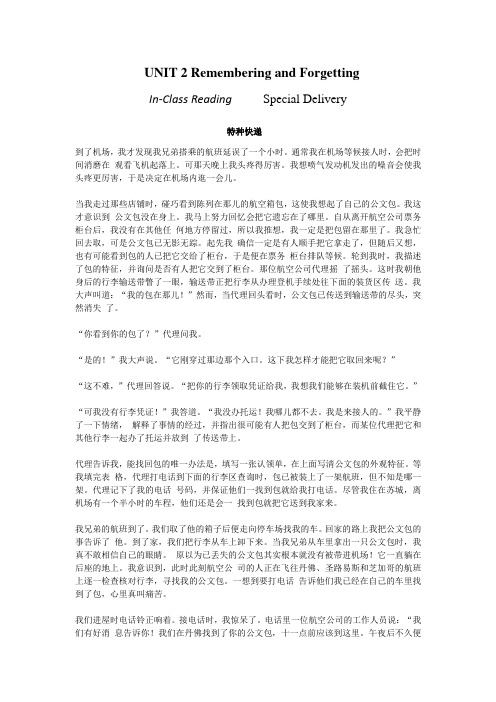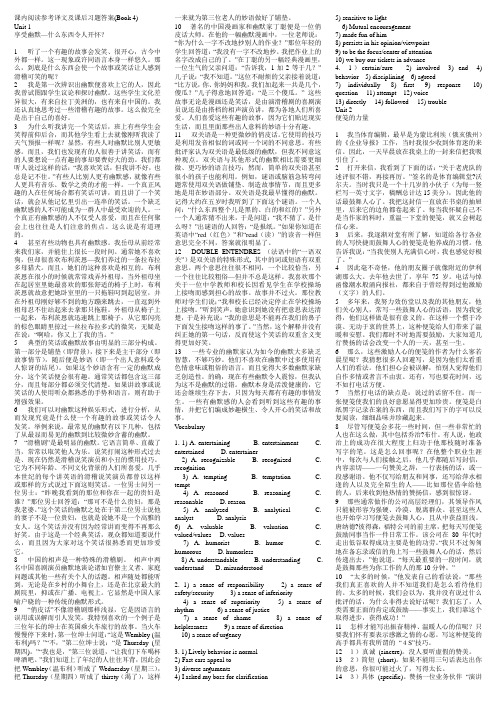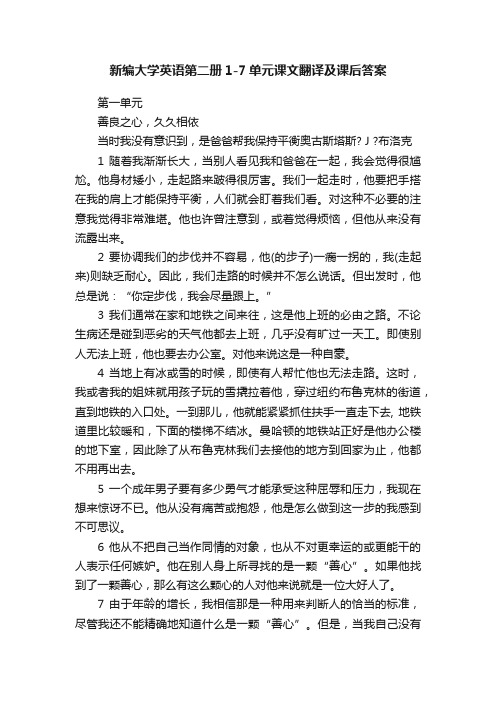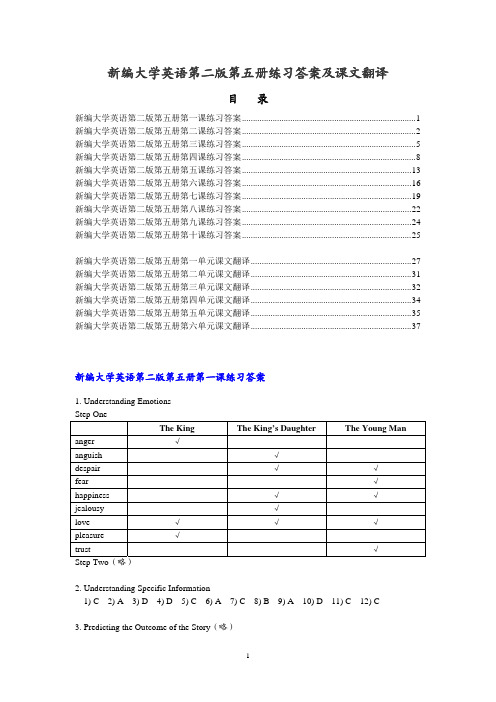新编大学英语课文翻译及课后练习答案
《新编大学英语》第三版第一册-课后翻译练习参考答案.

Book 1 Translation ExercisesUnit 1 Translation1当我知道详细情况时,我意识到我不该在办公室发脾气。
(should not have done 2我和鲍勃不是很熟,不过我们偶尔一起出去喝一杯。
(occasional3会议应该在周二召开,但我们不得不推迟(be supposed to4我国政府采取行动使那个国家的所有中国人回到了祖国( take action5包括周末在内,仅仅还有12天时间可以用来买圣诞礼物。
(including6如果不立即采取行动,许多种野生动物就会因饥饿而死亡。
(without, hunger1When I knew the details, I realized I shouldn’t have lost my tempers inthe office.2I don’t/didn’t know Bob very well, but we go/went out for anoccasional drink together.3The meeting is supposed to taken place on Tuesday,but we have to putit off.44Our government took action immediately to bring all the Chinesein that country back to motherland.5Including weekends, there are only twelve more days to buy Christmaspresents.6Without immediate action, many kinds of wild animals would die fromhunger.Unit 2 Translation1那首歌总是使她回想起在芝加哥度过的那个夜晚。
课文翻译及课后练习答案 新编大学英语(第三版)第一册 unit2

UNIT 2 Remembering and ForgettingIn-Class Reading Special Delivery特种快递到了机场,我才发现我兄弟搭乘的航班延误了一个小时。
通常我在机场等候接人时,会把时间消磨在观看飞机起落上。
可那天晚上我头疼得厉害。
我想喷气发动机发出的噪音会使我头疼更厉害,于是决定在机场内逛一会儿。
当我走过那些店铺时,碰巧看到陈列在那儿的航空箱包,这使我想起了自己的公文包。
我这才意识到公文包没在身上。
我马上努力回忆会把它遗忘在了哪里。
自从离开航空公司票务柜台后,我没有在其他任何地方停留过,所以我推想,我一定是把包留在那里了。
我急忙回去取,可是公文包已无影无踪。
起先我确信一定是有人顺手把它拿走了,但随后又想,也有可能看到包的人已把它交给了柜台,于是便在票务柜台排队等候。
轮到我时,我描述了包的特征,并询问是否有人把它交到了柜台。
那位航空公司代理摇了摇头。
这时我朝他身后的行李输送带瞥了一眼,输送带正把行李从办理登机手续处往下面的装货区传送。
我大声叫道:“我的包在那儿!”然而,当代理回头看时,公文包已传送到输送带的尽头,突然消失了。
“你看到你的包了?”代理问我。
“是的!”我大声说。
“它刚穿过那边那个入口。
这下我怎样才能把它取回来呢?”“这不难,”代理回答说。
“把你的行李领取凭证给我,我想我们能够在装机前截住它。
”“可我没有行李凭证!”我答道。
“我没办托运!我哪儿都不去。
我是来接人的。
”我平静了一下情绪,解释了事情的经过,并指出很可能有人把包交到了柜台,而某位代理把它和其他行李一起办了托运并放到了传送带上。
代理告诉我,能找回包的唯一办法是,填写一张认领单,在上面写清公文包的外观特征。
等我填完表格,代理打电话到下面的行李区查询时,包已被装上了一架航班,但不知是哪一架。
代理记下了我的电话号码,并保证他们一找到包就给我打电话。
尽管我住在苏城,离机场有一个半小时的车程,他们还是会一找到包就把它送到我家来。
新编大学英语4(第二版)Unit 1-Unit 6单元 课文翻译及课后答案详解

课内阅读参考译文及课后习题答案(Book 4)Unit 1享受幽默—什么东西令人开怀?1 听了一个有趣的故事会发笑、很开心,古今中外都一样。
这一现象或许同语言本身一样悠久。
那么,到底是什么东西会使一个故事或笑话让人感到滑稽可笑的呢?2 我是第一次辨识出幽默便喜欢上它的人,因此我曾试图跟学生议论和探讨幽默。
这些学生文化差异很大,有来自拉丁美洲的,也有来自中国的。
我还认真地思考过一些滑稽有趣的故事。
这么做完全是出于自己的喜好。
3 为什么听我讲完一个笑话后,班上有些学生会笑得前仰后合,而其他学生看上去就像刚听我读了天气预报一样呢?显然,有些人对幽默比别人更敏感。
而且,我们也发现有的人很善于讲笑话,而有的人要想说一点有趣的事却要费好大的劲。
我们都听人说过这样的话:―我喜欢笑话,但我讲不好,也总是记不住。
‖有些人比别人更有幽默感,就像有些人更具有音乐、数学之类的才能一样。
一个真正风趣的人在任何场合都有笑话可讲,而且讲了一个笑话,就会从他记忆里引出一连串的笑话。
一个缺乏幽默感的人不可能成为一群人中最受欢迎的人。
一个真正有幽默感的人不仅受人喜爱,而且在任何聚会上也往往是人们注意的焦点。
这么说是有道理的。
4 甚至有些动物也具有幽默感。
我岳母从前经常来我们家,并能住上很长一段时间。
通常她不喜欢狗,但却很喜欢布利茨恩—我们养过的一条拉布拉多母猎犬。
而且,她们的这种喜欢是相互的。
布利茨恩在很小的时候就常常戏弄外祖母,当外祖母坐在起居室里她最喜欢的那张舒适的椅子上时,布利茨恩就故意把她卧室里的一只拖鞋叼到起居室,并在外祖母刚好够不到的地方蹦来跳去,一直逗到外祖母忍不住站起来去拿那只拖鞋。
外祖母从椅子上一起来,布利茨恩就迅速跳上那椅子,从它那闪亮的棕色眼睛里掠过一丝拉布拉多式的微笑,无疑是在说:―啊哈,你又上了我的当。
‖5 典型的笑话或幽默故事由明显的三部分构成。
第一部分是铺垫(即背景),接下来是主干部分(即故事情节),随后便是妙语(即一个出人意料或令人惊讶的结尾)。
新编大学英语第二册1-7单元课文翻译及课后答案

新编大学英语第二册1-7单元课文翻译及课后答案第一单元善良之心,久久相依当时我没有意识到,是爸爸帮我保持平衡奥古斯塔斯? J ?布洛克1 随着我渐渐长大,当别人看见我和爸爸在一起,我会觉得很尴尬。
他身材矮小,走起路来跛得很厉害。
我们一起走时,他要把手搭在我的肩上才能保持平衡,人们就会盯着我们看。
对这种不必要的注意我觉得非常难堪。
他也许曾注意到,或着觉得烦恼,但他从来没有流露出来。
2 要协调我们的步伐并不容易,他(的步子)一瘸一拐的,我(走起来)则缺乏耐心。
因此,我们走路的时候并不怎么说话。
但出发时,他总是说:“你定步伐,我会尽量跟上。
”3 我们通常在家和地铁之间来往,这是他上班的必由之路。
不论生病还是碰到恶劣的天气他都去上班,几乎没有旷过一天工。
即使别人无法上班,他也要去办公室。
对他来说这是一种自豪。
4 当地上有冰或雪的时候,即使有人帮忙他也无法走路。
这时,我或者我的姐妹就用孩子玩的雪撬拉着他,穿过纽约布鲁克林的街道,直到地铁的入口处。
一到那儿,他就能紧紧抓住扶手一直走下去, 地铁道里比较暖和,下面的楼梯不结冰。
曼哈顿的地铁站正好是他办公楼的地下室,因此除了从布鲁克林我们去接他的地方到回家为止,他都不用再出去。
5 一个成年男子要有多少勇气才能承受这种屈辱和压力,我现在想来惊讶不已。
他从没有痛苦或抱怨,他是怎么做到这一步的我感到不可思议。
6 他从不把自己当作同情的对象,也从不对更幸运的或更能干的人表示任何嫉妒。
他在别人身上所寻找的是一颗“善心”。
如果他找到了一颗善心,那么有这么颗心的人对他来说就是一位大好人了。
7 由于年龄的增长,我相信那是一种用来判断人的恰当的标准,尽管我还不能精确地知道什么是一颗“善心”。
但是,当我自己没有的时候,我是知道的。
8 尽管很多活动我爸爸不能参加,但他还是尽量用某种方式参与。
当本地的一支棒球队发现缺经理的时候,他使它维持下去。
他是一个很懂行的棒球迷,经常带我去埃贝茨球场看布鲁克林的道奇队打球。
新编大学英语Unit2课文翻译与课后练习答案

Unit 2 Myths and LegendsIn-Class Reading Why the Tortoise’s Shell Is Not Smooth为什么乌龟的背壳凹凸不平1 从远处他妻子们的那些小木屋里传来的低声细语,时不时地被歌声打断,但是奥康瓦还是听到了,这是妻子们同各自的孩子在讲民间故事。
爱克蔚菲和她的女儿爱金玛坐在一块小地毯上。
现在,轮到爱克蔚菲讲故事了。
霎时,低声细语静了下来,所有的眼睛都转向她们最喜欢的故事能手。
2 “很久以前”,她开始讲道,“所有的鸟儿都被邀请到天上赴宴。
它们非常高兴,开始为这盛大的日子做准备。
它们用颜料把自己的身体涂成深红色并画上漂亮的图案。
3 “乌龟看到了所有这些准备活动,并很快了解了事情的来龙去脉。
动物界里发生的任何事都逃不过他的眼睛,(因为)他狡黠无比,诡计多端。
他一听说这一天上的盛宴,不禁垂涎三尺。
那些日子正在闹饥荒,乌龟已经有两个月没好好吃一顿饭了。
他的身体就像一段枯柴棍在空荡荡的躯壳里咔咔作响。
于是他稳扎稳打地开始计划如何能到天上去。
”4 “但是他没有翅膀呀,”爱金玛说。
5 “别性急,”她母亲回答道,“故事(的关键)就在这里。
乌龟没有翅膀,但他去找鸟儿们,请求能跟他们一起去。
”6 “‘我们太了解你了,’鸟儿们听了他的请求后说道。
‘你诡计多端并且忘恩负义。
如果我们答应你,你马上就会施展诡计。
我们老早就把你看透了。
’7 “‘你们不了解我,’乌龟说。
‘我已经脱胎换骨了,不再是你们以前所知道的那个捣蛋鬼了。
相反,我现在既体贴又善良。
我已经认识到,给别人制造麻烦的人就是在给自己制造麻烦。
放心吧,我保证不给你们增添任何麻烦。
’8 “乌龟巧舌如簧,没过多久,所有的鸟儿都一致认为,他确实已经脱胎换骨了,于是每只鸟儿都给了他一根羽毛,用这些羽毛,乌龟做了两只色彩绚丽的翅膀。
9 “最后,这盛大的日子终于来到了,乌龟第一个到达了集合地点。
等所有的鸟儿都来齐了,他们就一块儿动身。
新编大学英语第二版第五册课文翻译及课后答案

新编大学英语第二版第五册第二课练习答案
Post-Reading 1. Understanding the Organization of the Text
2
1) Introduction: (Para.1) A homeless man expresses thanks to a man holding the door for him Setting: a local restaurant Characters: shoppers, families and students Situation: the coming and leaving of a homeless man 2) Main Body (Para.2-11) There’s a lack of good manners in today’s world. Supporting evidence: AAt the restaurant, no one thanked the people providing the service; (Para.2) BWomen hardly show their gratefulness to people for their help while driving; (Para.4) CFewer men hold open doors for those behind them; (Para.4) DVery often parents do not apologize for what their children do; (Para.7) EChildren are not schooled in social graces; (Para.8) FRude language is so commonplace that it is accepted behavior. (Para.10) 3) Conclusion (Para.12-13) The importance of manners: In a crowded world, being polite to each other helps ease our daily stress. 2. Understanding Specific Information 1) B 2) B 3) C 4) A 5) C 6) C 7) B
新编大学英语第三册课后答案课文翻译

Unit 1 PersonalityVocabulary (P16)1. 1) self-conscious 2) self-confidence 3) self-esteem 4) self-destructive 5) self-worth6) self-concept 7) Self-awareness 8) self-assurance/self-confidence2. 1)B 2)I 3)L 4)A 5)H 6)D 7)E 8)N 9)J 10)M 11)C 12)F 13)G 14)K3. 1) profound 2) jealousy 3) numerous 4) overweight 5) overcome 6) eventually 7) slim8) compliments 9) diminish 10) reassurance 11) detrimental 12) isolated 13) self-esteem 14) accented 4. 1) reflected 2) concerned/worried 3) profound effect/influence 4) viewed/regarded 5)sensitive6) respond/react 7)eliminated 8)overcome my fear 9) concentrate on 10) made no comment Translation (P17)1) You should spend a reasonable amount of time relaxing and exercising.2) In general children are healthier and better educated than ever before.3) When the right opportunity comes along, he’ll take it.4) Every day he sets aside some time to be with his family and enjoy life.5) I remember those dark streets and walking hand in hand with my father.6) He finally failed to live up to his parents’ expectations.7) In contrast, our use of oil has increased enormously.8) He succeeded in his efforts to overcome his fatal weakness.Part Four Writing and Translation (P46)2. Translation Practice1) It is believed that pessimism often leads to hopelessness, sickness and failure.2) Optimism, by contrast, can make you happy, healthy and successful.3) When you fail in something, profit from the failure as a learning experience.4) Think about your strengths and build up self-confidence in front of problems or difficulties.5) Don’t let negative thoughts hold you back.6) Everyone has experienced failures and disappointments, so don’t blame yourself too much.Unit 2 Myths and LegendsVocabulary (P62)1. 1) A. invitation B. invited C. inviting 2) A. prepare B. prepared C. preparation D. preparatory/preparation3) A. discoveries B. discoverers C. discovered4) A. approval B. approve C. approved D. approving E. disapprove5) A. eloquent B. eloquence C. eloquently6) A. faithful B. unfaithful/faithless C. faith d. faithfully7) A. occasional B. occasionally C. occasion8) A. delivery B. delivering C. delivered9) A. troublesome B. troubled C. troubled D. troubling10) A. assurance B. assured C. assure2. 1) got/ran into trouble 2) no trouble 3) asking for trouble 4) have … trouble 5) trouble with 6) in serious/deep/big trouble 7) get/getting … into trouble 8) took the trouble3. 1) with a pattern of roses 2) prepared a wonderful/goof meal for us3) promised faithfully 4) deliver this letter5) a selection of milk and plain chocolate 6) keep out of mischief/behave themselves7) the sound of distant thunder 8) received approval from the government9) in spite of the fact that he drank too much 10) agree whether the drug is safe or notPart Three Further Development5. Complete the following Ancient Chinese story by translating the Chinese into English(P93)1) the true reason why there was no such animal in Guizhou2) they were of no use at all in this place3) when he saw the donkey all of a sudden, he thought it was a monster4) he hid himself in the trees while looking at the donkey5) what kind of animal is this and why does it look different from other animals that I’ve seen?6) But one day the donkey stretched its thin neck and cried7) the tiger discovered that the donkey didn’t have any other skills besides crying8) But he dared not rush to it and eat it just as he did to other animals9) This did irritate the donkey (made the donkey angry), who raised its hind leg and kicked the tiger10) This time he rushed to it without hesitation and bit its rhroatPart Four Writing and Translation2. Translation Practice(P96)万物之初,天地还是一体,充满混沌。
新编大学英语第三版第三册Unit1课文翻译及课后练习答案

Unit 1 PersonalityIn-Class Reading羞怯的痛苦1 对许多人来说,羞怯是很多不愉快的起因。
各种各样的人——矮的、高的、愚笨的、聪明的、年轻的、年老的、瘦的、胖的——都说自己是羞怯的。
羞怯的人会焦虑不安,感到不自然;也就是说,他们过分地关注自己的外表和举止。
脑海中不断盘旋着一些使自己不安的想法:我给人留下的是什么印象?他们喜欢我吗?我讲话是不是傻里傻气?我长得难看。
我穿的衣服毫不引人注目。
2 很显然这种不安的感觉会对人产生不利的影响。
一个人的自我看法反映在自己的行为方式之中,而一个人的行为方式又影响他人的反应。
通常,人们如何看待自己对他们生活的各个方面都会产生深刻的影响。
例如,具有积极的自我价值观或很强自尊心的人往往表现出自信。
而由于自信,他们不需要他人不断地称赞和鼓励,也能使自己感觉良好。
自信者热情、自发地投入生活。
他们不因别人认为他们“该”做什么而受到影响。
有很强自尊心的人不会被批评所伤害;他们不会把批评看作是人身攻击。
相反,他们认为批评是一种提醒他们改进的建议。
3 相比之下,羞怯的人自尊心较弱,往往消极被动并且容易受他人影响。
他们(是否)在做“该做的事情”需要得到别人的肯定。
害羞的人对批评非常敏感;他们觉得批评正好证实了他们比别人差。
他们也很难因别人的赞美而高兴,因为他们相信自己不值得称赞。
羞怯的人也许会用这样的话来回答别人的赞美之辞:“你这么说只是为了让我感觉好一些。
我知道这不是真的。
”显然,尽管自我意识是一种健康的品质,过分的自我意识却是不利和有害的。
4能否彻底消除或者至少减轻羞怯感呢?幸运的是,人们能够通过坚持不懈的努力建立自信从而克服羞怯。
由于胆怯和缺少自尊是密切相关的,因此正视自己的弱点和正视自己的优点一样重要。
例如,大多数人希望每门功课都得A。
5 如果仅仅因为在某些领域有困难,就把自己列为差生,这不恰如其分。
人们对自己的期望必须现实。
老是想那些不可能的事情会令自己觉得无能,甚至产生嫉妒。
- 1、下载文档前请自行甄别文档内容的完整性,平台不提供额外的编辑、内容补充、找答案等附加服务。
- 2、"仅部分预览"的文档,不可在线预览部分如存在完整性等问题,可反馈申请退款(可完整预览的文档不适用该条件!)。
- 3、如文档侵犯您的权益,请联系客服反馈,我们会尽快为您处理(人工客服工作时间:9:00-18:30)。
新编大学英语综合教程3 第三版课后答案Reading Comprehension1. Understanding the Organization of the Text1) Introduction: (para.1)Shyness is the cause of much unhappiness for a great many people.2) Reasons why shyness can have a negative effect: (para.2—3)Peop le’s self-concept has a profound effect on all areas of their lives.People with high self-esteem usually act with confidence.People with low self-esteem are likely to be passive and easily influenced by others.3) Ways of overcoming shyness: (para.4—15)i) Recognize your personal strengths and weaknesses.ii) Set reasonable goals.iii) Don’t waste time and energy on destructive feelings such as guilt and shame.iv) Don’t be afraid to speak up and give your point of view.v) Do not make negative comments about yourself.vi) Accept criticism thoughtfully.vii) Profit from failures and disappointments by viewing them as learning experiences.viii) Do not associate with people who make you feel inadequate.ix) Set aside time to relax, enjoy hobbies, and reevaluate your goals regularly.x) Practice being in social situations.4) Conclusion: (para.16)The better we understand ourselves, the easier it becomes to live up to our full potential.2. Understanding Specific Information1) F 2) T 3) T 4) T 5) F 6) T 7) F 8) F3. Group Discussion1) I think the most effective ways of overcoming shyness are the first and seventh ways.Recognizing our personal strengths and weaknesses is useful because if we know ourselves better, we can feel more self-confident. We can be more objective, instead of being blind. The seventh way is to profit from failures and disappointments as learning experiences. If we allow ourselves to get discouraged and sad when we fail, then we will feel more unsure of ourselves. But if we think of a failure as a learning experience, we are adopting a positive attitude. By analyzing objectively why we failed and planning how to set about doing things differently we will be more likely to succeed next time.2) Modesty is used to describe a reserved appraisal of one’s merits, abilities or success. Theopposite of modesty is arrogance or boastfulness. Modest people don’t want to talk about theirabilities or achievements. Modest people know their strengths and their worth, but choose to downplay their greatness and be humble. So modesty is the result of confidence. Shyness is used to describe the uncomfortable feeling one has in the company of others. It often implies a lack of self-confidence and a timid, reserved manner. Modesty is a good personality trait while shyness in many cases is undesirable.3) B eing shy isn’t necessarily a bad thing.It is appropriate and normal to be shy in some circumstances, for example, in the pres ence of teachers, your boss, your parents’ friends or your prospective in-laws; when you are dating someone, especially the first time; when you are with strangers; when you are in a new environment; when you’re facing a large audience. In fact, it can eve n be helpful to be a little shy. When you’re shy and keep silent, you may spend a little time observing the surroundings and people around before jumping right into the new situation.Vocabulary1. “Self-”is a prefix which means “of, to or by oneself or itself” .Words with the prefix “self-” that appear in the text: self-conscious, self-concept, self-assurance, self-worth, self-confidence, self-esteem, self-destructive, self-awareness, self-acceptance, self-rejection, self-confident.1) self-conscious (worried and embarrassed about what you look like or what other people think of you)2) self-confidence (belief in one’s own ability, power, judgment, etc.; confidence in oneself)3) self-esteem (the feeling that you are someone who deserves to be liked, respected, or admired)4) self-destructive (with thoughts or actions that are counter to one’s own best interests)5) self-worth (the value you give to your life and achievements)6) self-concept (one’s conception or general idea of one’s own basic characte r and nature)7) self-awareness (realistic knowledge and judgment about oneself)8) self-assurance/self-confidence (the belief that you are able to deal with people and problems easily)2. Part A1) G 2) I 3) A 4) F 5) C 6) D 7) J 8) B 9) E 10) HPart B1) profound 2) jealousy 3) overcome 4) eventually 5) compliments6) diminish 7) reassurance 8) detrimental 9) isolated 10) accented3. 1) reflected 2) concerned/worried 3) profound effect/influence 4) viewed/regarded 5) sensitive 6) respond/react 7) eliminated 8) overcome my fear 9) concentrate on 10) made no commentTranslation1. Shyness can vary from feeling mild discomfort to high levels of anxiety that impact us in almosteverything we do.2. Despite his stubbornness, he knew in his heart that he should avoid arousing any suspicions.3. It will be interpreted as criticism no matter what you say.4. Let’s not allow ourselves to be upset by trifles (which) we should despise and forget.5. Too much time spent dwelling on the past can get in the way of enjoying life as it happens.6. People who believe they can accomplish goals and solve problems are more likely to do well inschool.Further Development1. Enriching Your Word Power1) B 2) B 3) A 4) B 5) C 6) C 7) C 8) A 9) A 10) C哈哈,等我再上传啦。
